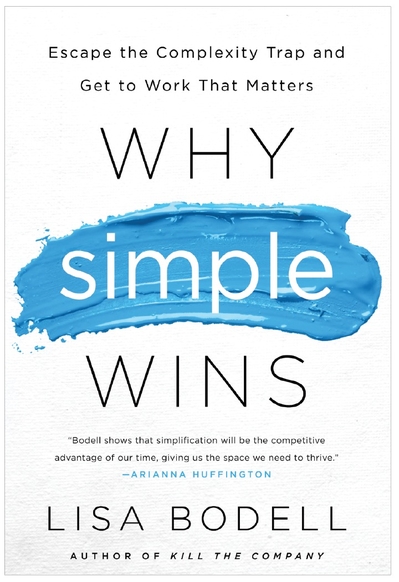An activity I’ve been doing for years is looking for ways to simplify areas in my life. I just don’t like anything to be overcomplicated. I find it unnecessary and a real time waster. So, when a good friend introduced me to the book Why Simple Wins: Escape the Complexity Trap and Get to Work That Matters by Lisa Bodell, its title quickly caught my attention. 
Why Simple Wins has taken the basic idea of simplifying life to new heights. It tackles various topics, including concise business writing, strategic planning, employee engagement, and other workplace challenges, all of which can be improved with simplification. In fact, the author provides an entire toolkit on the process.
Why Simple Wins challenges readers to find ways to simplify and improve organizations. Bodell has studied the topic with many different companies and with numerous clients. Not only has she studied the problem of complexity, she has also developed the tools needed to get us to a simpler process. Simplicity will help increase productivity and job satisfaction, and retain great employees—goals we all share and struggle with globally. It can even increase a company’s bottom line.
In the book, Bodell points out that we are all our own enemies in the effort to move from complexity to simplicity. If we hate meetings, why do we schedule and attend so many? If we hate the volume of emails we receive, why do we send and forward so many? If our employees are not happy, have we taken the time to investigate the core reason?
As we become more experienced global managers and leaders, we realize that unhappy employees lead to increased turnover, which is expensive. Keeping good employees happy saves money. That’s exactly what millennial employees are looking for in the job market. Job satisfaction is a high priority for them. When they run into roadblocks and feel like their contributions are not being recognized or feel they are being oppressed because of too much red tape, they tend to change jobs faster than employees from previous generations.
I think we all want the same thing—to feel like we contribute our skills, abilities, and knowledge and feel appreciated by our employer. Is it possible that the over-complexity of tasks, processes, and procedures is what robs us of feeling satisfied by our jobs?
Why Simple Wins does require some work if you want to make a serious effort and simplify your life. If you choose to continue with the training, there is a second book called Why Simple Wins Toolkit, which includes the top 13 tools, techniques, and tips discussed in the first book.
Companies around the globe have similar goals: to be the best at what they do, be the type of place employees want to work, and be successful. With Why Simple Wins, employees can learn how to be more efficient, and find meaning in their work. It’s that simple.